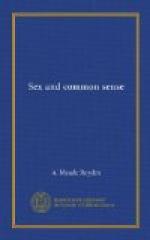We shall also, I believe, get rid of those perversions which darken understanding as well as joy. One need not go all the way with Freud—one may, indeed, suspect him of suffering from a severe “repression” himself—while admitting, nevertheless, that much of the folly that surrounds our treatment of sex-questions is due to the pathetic determination of highly respectable people to have no sex nature or impulses at all. Certainly this accounts for much that is called “prudery” in women, whose repressed and starved instincts revenge themselves in a morbid (mental) preoccupation with the details of vice. I am forced to the conclusion that it has also something to do with the quite extraordinary description that certain ecclesiastics give of their own inability to control their imaginations even at the most solemn moments. A narrow and dishonest moral standard has been foisted upon women in these matters, and instead of knowing themselves and learning to control their natures, they have been given a false idea of their own natures, and taught instead merely to repress them. So, very often, a curiously artificial code of manners has been accepted by the clergyman—a code which has been crystallized in a phrase by calling the clergy “the third sex”—and he, like the women, should be in revolt against it if he is to be saved. Indeed, we are or should be allies, not foes. Let the priest or minister wear the same kind of collar as other people, mix with them on equal terms, and then, if he has a higher moral standard than they, it will be his own standard, accepted by him because it commands his homage, and not a standard imposed on him merely because he belongs to a certain caste. It is always the code of morals imposed from without that does mischief, and results in the repressions and perversions about which modern psychology has taught us so much.
It will perhaps be urged that the peculiar dangers of which ecclesiastics are conscious are due to the psychological fact that the erotic and religious emotions are closely allied. That this is a fact will hardly be doubted. But again the problem is either an individual one, or it must be solved by abandoning our present position and reverting to that of an earlier and cruder civilization. It is possible to argue that eroticism and religion are so nearly allied and so easily mistaken for one another, that safety and sincerity alike demand separate worship for men and women.[F] It is also possible to leave it to the individual to manage himself, conquer where he can and flee where he cannot. But it is not possible, on grounds of religious eroticism, to protect men from listening to a woman preaching, at the cost of compelling women to listen to no one but a man; or insist on the intolerable cruelty of compelling a man-priest to celebrate mass with a woman server, while forcing the woman to make her confession to a man.
[Footnote F: As, e.g., among the Mahometans and, to a less extent, the Jews.]




